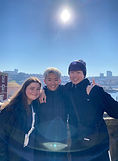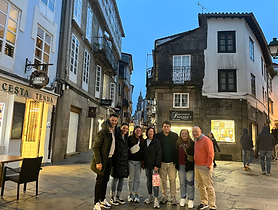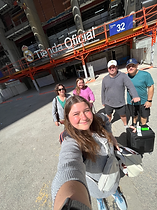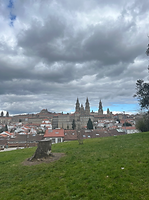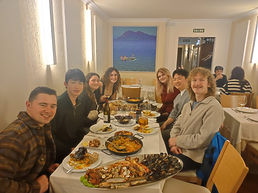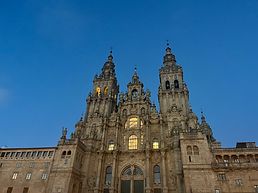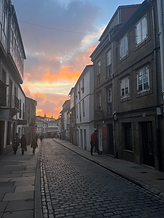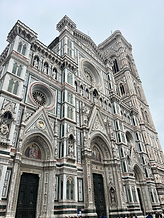Claire Crowder
Study Abroad
Santiago de Compostela, Spain (January-April, 2023)
Introduction
When I arrived at Clemson in the fall of 2021, I made a promise to myself: no matter how much I loved Clemson and being on campus with my friends, I would spend a semester abroad. Now, looking back on my four years at this wonderful university, I can confidently say that my favorite semester was the one I spent in Santiago de Compostela, Spain. Through my study abroad experience, I felt like I was able to experience life as a Spaniard, from learning the bus routes during my first week to rooting for Real Madrid in bars packed with locals. Through this essay, I hope to paint a picture of just how impactful my study abroad experience was on my time in college, as well as what cultural aspects stood out to me during my time in Spain.
In the few weeks leading up to my study abroad, I wrote down a few goals for myself. Some of those goals were easy to accomplish, such as finding a good paella and watching lots of soccer, but others were much deeper and more challenging, such as only reading and watching television in Spanish for the entire semester, becoming more comfortable doing things by myself (made even more difficult in a foreign country), and "immersing myself in the culture," a generic phrase that actually turned out to be an integral part of my study abroad experience. I am happy to report, almost two years after arriving home from Spain, that I did find good paella, watch lots of soccer, watch TV exclusively in Spanish, and, most importantly, became more comfortable doing things by myself and immersing myself in Spanish culture.
Cultural Differences
The biggest surprise that I encountered in Spain was that I didn't feel the sense of culture shock that I had been so fervently warned about before leaving the United States. I was told that the first few weeks would be extremely difficult, and I would feel a wave of sadness and depression while trying to adapt to a new way of life. Honestly, other than the time difference, my first couple of weeks were incredible: after class each day, I would spend hours walking through the streets of Santiago and neighboring cities, sitting down for tapas in the afternoon and meeting up with new friends from around the world. It truly felt like the life that I had been missing in the United States: I could walk from one point of the city to another in twenty minutes or less, there were cultural/musical events in the city most days of the week, groups of students from around the world with extremely different cultural and linguistic backgrounds with whom to share stories and experiences, and, best of all, an environment where I was completely surrounded by the Spanish language. Obviously, there were several major adjustments that came with spending multiple months in a new country. For example, it took me a couple of weeks to adjust to the 2:30 PM lunch time and 9:00 PM dinner time, the fact that I would hear people roaming the streets well into the night (often until 5:00 or 6:00 AM on weekends), and the lack of air conditioning on especially hot days. However, none of the adjustments that I had to make to my daily routine ever felt like a "culture shock." It felt more like I was taking a pause from my life in the United States to experience life from a completely new perspective.
Host Family
I can undoubtedly say that my study abroad experience was so great because of my host family. I got along with my host parents almost immediately and they became absolutely essential in helping me adjust to living in a new country. They made me lists of their favorite restaurants and foods to try, walked me to my class building on the first day, drove me to the airport whenever I was taking a trip, and were constantly willing to help me improve my Spanish competency. I remember staying up late several nights having in depth conversations with them about American culture and how life in Spain and life in the United States differed from a political, social, and economic standpoint. We shared countless travel stories over dinner and day trips to the coast of Galicia. From the first day I lived in their apartment, I could feel how much pride they had for their city and how excited they were to share that with me every day. Even two years after living with them, we still talk regularly, which allows me to keep up with their lives and maintain my connection to Spain and to Santiago de Compostela.
Daily Life
My days in Santiago began in a similar way to those in Clemson. I would wake up around 8:00 AM every day, get dressed for the day, have coffee and breakfast with my host parents, and then make the five minute walk through town to get to class at 9:15. Each day, we had class from 9:15-11:15, a break from 11:15-11:45, and more class until 2:00 PM. For the final hour each day, we would go to a new class with a new teacher in a seminar-style environment, discussing rotating topics such as healthcare, tourism, history, and other culturally relevant topics. Following the end of class, I would either grab lunch with friends or head home to eat with my host parents. On Mondays, I would spend two hours of my afternoon volunteering at Cáritas, an NGO with locations throughout Spain. I specifically volunteered in an after-school program where I helped students with their English homework and played games to improve their conversational skills. On Thursdays, I had evening class with my professor from Clemson. The topic of our class was Spanish female directors and their exploration of human rights. Any other afternoon would be spent catching up with family and friends back home, exploring a neighboring town, walking the streets of Santiago, or catching up on homework and other tasks. Dinner would be at 8:30 PM every day (unless I was going out with friends) and then I would either meet up with friends late into the night or watch TV with my host parents. Many weekends were spent flying to other cities, both within Spain and in Europe (for example, we explored the Canary Islands, London, Florence, Porto, Bordeaux, Valencia, and Barcelona). Each day brought a unique challenge, as well as unique opportunities to connect with new people, make new friends, and practice my Spanish skills.
Conclusion
One of the most impactful outcomes of my semester abroad was being able to experience navigating life in a foreign country and interacting with locals during this journey. I was never happy when waiters and shop owners switched to English when they heard my accent (I constantly doubted my Spanish abilities) or when my host parents would have to repeat words or phrases several times before I could grasp what they were saying. In conversations with native speakers, I felt like I was constantly an outsider and could never fully understand what they were talking about, especially if the topic was related to some cultural concept that I had never encountered. When I returned to the United States, I felt like I had gained a new appreciation for and understanding of people who immigrate to our country from various places around the world. I understood how difficult it was to live life in a non-native language, to live in a place with unfamiliar foods and culture, and how long it took to fully adapt to that reality.
While it sounds, cliche, I feel confident in saying that my study abroad experience changed the way I perceive the world and myself, and I am incredibly thankful that I had the opportunity. While my day-to-day life in Spain mirrored that of the United States (wake up, attend 3-4 hours of class, do homework, spend time with friends, go to bed), nothing will compare to the hours spent in outdoor cafes people-watching and getting to know new friends, catching the bus to the airport right after class on Fridays to catch a flight to London or Bologna, Italy, or learning about and celebrating Spanish holidays with my host parents. On top of all of this, the language immersion aspect vastly improved my conversational abilities and gave me a boost in confidence to use Spanish even in uncomfortable settings. I am eternally grateful to everybody that contributed to making my experience in Spain so memorable and I will look back fondly on these memories for the rest of my life.



